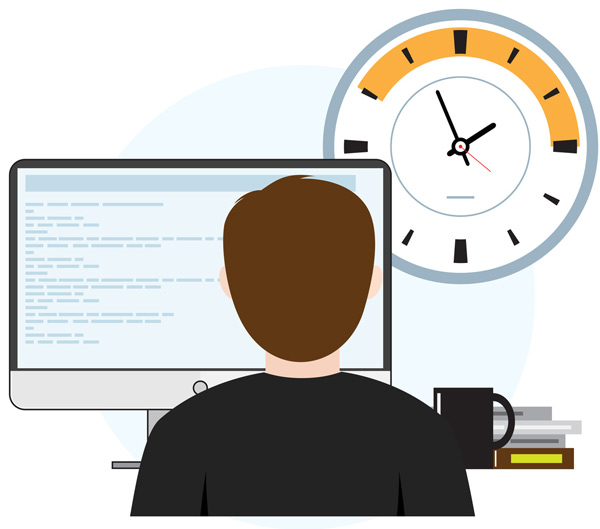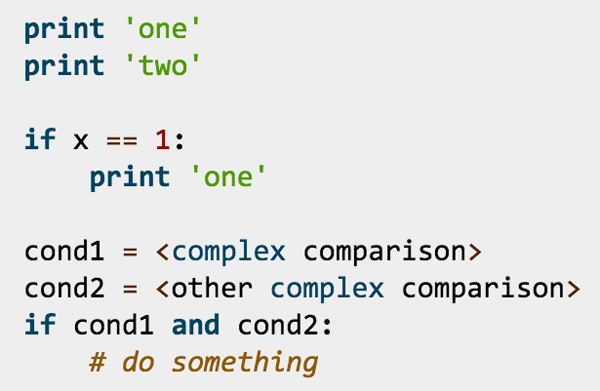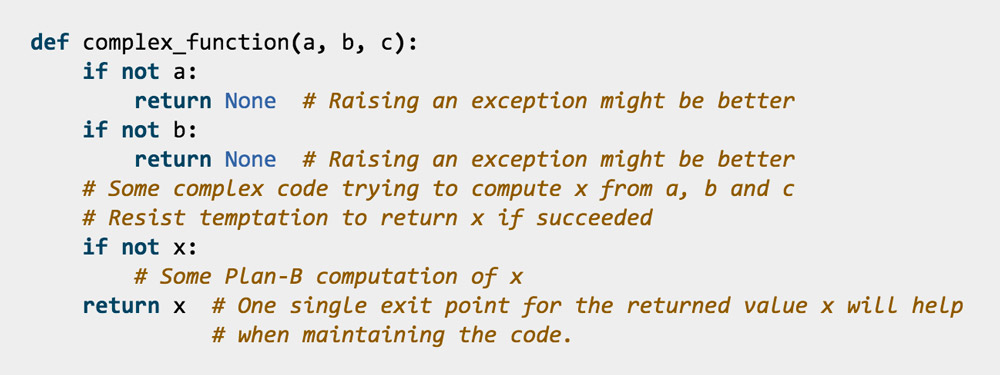10 Time-saving Tips for Pythonists
Key Takeaways
- Avoid using semicolons in Python as they are optional and can make the code harder to read. Instead, Python uses indentation to determine the grouping of statements.
- Choose a good code editor that supports flake8 and PEP8 in real time, follow Python code style for enhanced readability, and make use of the help() function for quick access to descriptions of other functions.
- Utilize Python libraries to prevent reinventing the wheel, comment your code rigorously for future reference, test often to identify and fix bugs early, and try to write Python code daily to build familiarity and speed.

Python is a beautiful language, able to inspire love in its users. So if you’re looking to get into programming, or if you’re a bit tired of C++, Perl, Java and the rest, I recommend you give Python a try.
Python has many features that make it attractive to programmers. It’s easy to learn, object oriented, byte-compiled, free and open-source. It also has run-time type checking, full and fast support, and extensive libraries for performing various tasks.
Efficiency with Python
In this article, I want to highlight some of the ways you can save time in Python and thus maximize productivity.
In preparation, I quizzed several Pythonists on their best time-saving tips. Here are the results …
1. Don’t Use Semicolons
Since using semicolons is considered optional in Python—as opposed to other object-oriented programming languages—you don’t need to end each statement of your code with a semicolon.
This may seem simple and not really time wasting; but once your code stretches into thousands of lines, all these semicolons can get a bit distracting, and it’s a lot of unnecessary typing.
2. Get a Good Code Editor
Choosing the right Python editor can be a huge time saver. Many new Python programmers are confused over which code editor to pick—especially with so many available.
It’s very disruptive to get used to one editor and then have to change to another, so it’s best to start with a good one. Make sure whichever you choose does flake8 and PEP8 in real time.
For guidance on which editor to choose, see my previous article on Which Code Editors Do Pythonists Use?
3. Follow the Python Code Style
 Following the Python code style can enhance the readability of the code, and thus saves time while walking through your code. (The design philosophy of Python emphasizes the issue of code readability.)
Following the Python code style can enhance the readability of the code, and thus saves time while walking through your code. (The design philosophy of Python emphasizes the issue of code readability.)
4. Use the help() Function
Python’s help() is a very handy, built-in function that can save a lot of time—for example, when searching for descriptions of other functions. You can simply run this function directly from your interpreter console.
The Python documentation describes the ways you can put this function to good use.
5. Use Libraries
There are lots of Python libraries that save you from reinventing the wheel every time.
For example, you can choose from a range of packages offered by PyPI (the Python Package Index), a repository of Python software.

A nice example of a Python library is scikit-image. It enables image processing tasks like blurring, enhancing contrast and zooming—simply by calling functions.
6. Use Cookiecutter
 Cookiecutter is a command-line utility that enables you to create all your Python project boilerplates from project templates, and this can be a big time saver.
Cookiecutter is a command-line utility that enables you to create all your Python project boilerplates from project templates, and this can be a big time saver.
7. Comment Rigorously
Getting in the habit of commenting your code will save you—and others—a lot of time, especially down the track. (Yes, we hear this a lot, but many programmers still need to be reminded, it seems!)

Commenting is particularly vital when working on teams—especially ones that change a lot.
8. Test Often
Try to test every component in your program. While it may sound time-consuming, testing as you code saves a lot of time in the long run, and reassures you that there are no hidden bugs. It also reinforces your understanding of what each piece of code is actually doing.
A REPL—a read-eval-print loop—is a common means of testing your code as you go, and is often employed by Pythonists.
9. Focus and Specialize
 A common recommendation of accomplished Pythonists is to have a specialized focus or area of expertise. There are lots of things you can do with Python—from coding for web cams to dealing with computations and mathematics.
A common recommendation of accomplished Pythonists is to have a specialized focus or area of expertise. There are lots of things you can do with Python—from coding for web cams to dealing with computations and mathematics.
There are great libraries available to help with these tasks, such as SimpleCV, dealing with computer vision; Biopython, a library for biological computation; and SymPy, a library for dealing with symbolic mathematics.
Digging into areas like these, and mastering a particular framework, helps you learn Python at a deeper level, master a particular style of coding (mentioned in point 3), and deal with specialized types of problems.
10. Write Code Every Day
When you get in the habit of writing Python code every day, solving problems using Python will start to become second nature. You’ll start to think in Python, so to speak, and this ultimately helps you to navigate and solve issues faster.
Wrapping Up
In this brief article, I’ve listed the main tips I gathered while talking with Pythonists about time-saving tricks. Here are a few others that I could have added to the list.
Attend Python Events and Meetups
 Make sure to attend events and meetups where possible. They’re great for sharing experiences, best practices, tools, and other interesting topics.
Make sure to attend events and meetups where possible. They’re great for sharing experiences, best practices, tools, and other interesting topics.
It may not be obvious that this is a time-saving strategy, but learning from the experiences of others—through advice, tips and hacks—is another way to avoid reinventing the wheel.
A great event to check out is the annual PyConf.
Think on Paper
Thinking on paper—before diving straight into code—will give you the flexibility to change. Going straight to code forces you to get involved in implementation details from the outset, which is not always the best use of your time when starting a project. Paper’s distraction-free mode is great for brainstorming and problem solving!
Master the Fundamentals
Lastly, it may seem obvious, but make sure to invest time in learning the fundamentals of Python. This will eventually save you a lot of time, as you’ll be better prepared to tackling more complex topics.
Some good books to help with this include
- Learning Python
- Python Programming for Beginners: An Introduction to the Python Computer Language and Computer Programming.
It’s also important to keep abreast of news as it happens, by reading blogs and articles. A great blog to follow is The Mouse Vs. The Python.
Well, I’m sure there are more things that could be added to the list. What are your best time-saving tips when programming Python? Let me know in the comments!
Frequently Asked Questions (FAQs) about Python Programming
Why is the use of semicolons discouraged in Python?
Python is designed to be a highly readable language, with clear and unambiguous syntax. The use of semicolons in Python is often discouraged because it can make the code harder to read and understand. Unlike languages like C or Java, Python does not require semicolons to terminate statements. Instead, Python uses indentation to determine the grouping of statements. This makes the code cleaner and more readable. However, semicolons can be used in Python to separate multiple statements on a single line, but this is generally discouraged unless absolutely necessary.
How does Python handle comments in the code?
Python uses the hash symbol (#) for single-line comments. Anything after the # on that line is considered a comment and is ignored by the Python interpreter. For multi-line comments, Python uses triple quotes, either ”’ or “””. Everything enclosed between the triple quotes is considered a comment. Comments are a crucial part of programming as they help others understand what your code is doing, and they can also be used to prevent execution when testing code.
What are some time-saving tips for Python programmers?
Python offers several features that can help save time. For instance, list comprehensions can be used to create lists in a single line of code, instead of using multiple lines with a for loop. The zip function can be used to iterate over two or more lists in parallel. Python also supports multiple assignment, which allows you to assign values to multiple variables at once. Using built-in functions and libraries can also save a lot of time, as they provide pre-written code to perform common tasks.
Why is Python considered a high-level language?
Python is considered a high-level language because it abstracts many of the complexities of the machine. This means that Python code is designed to be easy for humans to read and write, rather than being easy for a machine to understand. Python code does not need to be compiled before it is run, and it uses simple syntax and data structures, making it a great language for beginners.
How does Python handle errors and exceptions?
Python uses a system of built-in exceptions and error messages to handle errors. When an error occurs, Python will usually stop and generate an error message. These error messages can be caught and handled using try/except blocks. This allows the programmer to control the program flow and to handle errors gracefully, instead of letting the program crash.
What is the role of indentation in Python?
Indentation in Python is not just for readability, but it is a language requirement. Python uses indentation to determine the grouping of statements or to define a block of code such as loops, if statements, and functions. This makes the code cleaner and more readable. The standard indentation requires four spaces for each level of syntactic indentation.
How can I improve my Python coding skills?
Practice is key to improving your Python coding skills. Try to solve different problems and implement various projects. Reading and understanding others’ code can also be very beneficial. Participate in coding challenges and hackathons. Also, understanding the Pythonic way of coding can make your code more efficient and clean.
What are the best practices for writing Python code?
Some of the best practices for writing Python code include following the PEP 8 style guide, writing comments, using meaningful variable names, keeping functions small and focused, handling exceptions, and writing tests for your code. It’s also important to keep your code DRY (Don’t Repeat Yourself) and to use the built-in functions and libraries whenever possible.
How can I make my Python code run faster?
There are several ways to make your Python code run faster. These include using built-in functions and libraries, using local variables, using list comprehensions and generator expressions, avoiding unnecessary loops, and using the right data structures. Profiling your code can also help you identify bottlenecks and optimize your code.
What are some common mistakes Python beginners make?
Some common mistakes Python beginners make include not understanding Python’s indentation rules, not using Python’s built-in functions and libraries, not writing comments, not handling exceptions, and not testing their code. It’s also common for beginners to write code that is not Pythonic, i.e., code that does not follow Python’s idiomatic practices.
Doctor and author focussed on leveraging machine/deep learning and image processing in medical image analysis.


